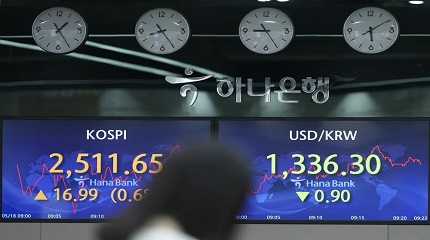
BEIJING (AP) — Global stock markets and Wall Street futures rose Thursday on hopes U.S. political leaders can reach agreement to avoid a potentially disastrous default on government debt.
London and Paris opened higher. Shanghai, Tokyo and Hong Kong advanced. Oil prices edged lower.
Wall Street rallied Wednesday after President Joe Biden expressed confidence “America will not default” despite lack of agreement on Republican demands for cuts in aid to poor families in exchange for raising the amount the government can borrow.
“Markets are now fully pricing an in-time resolution of the crisis,” said Clifford Bennett of ACY Securities in a report. “No one wants to sell ahead of an announcement of a deal being made.”
In early trading, the FTSE in London rose 0.7% to 7,776.24. The DAX in Frankfurt gained 1.5% to 16,187.47 and the CAC 40 in Paris advanced 0.9% to 7,468.73.
On Wall Street, futures for the benchmark S&P 500 index and the Dow Jones Industrial Average were up 0.1%.
On Wednesday, the S&P 500 and the Dow both rose 1.2%. The Nasdaq composite gained 1.3%.
Stocks of companies that get much of their revenue from the federal government rose. Military contractor Lockheed Martin climbed 2.1%. Northrop Grumman gained 2.7%.
Speaker Kevin McCarthy of the House of Representatives said Tuesday the two sides were far apart but could reach a deal by the end of the week. The U.S. government will run out of cash if they don’t agree by June 1 to increase its borrowing limit.
Any disruption in U.S. government borrowing and debt payments could send shockwaves through the global financial system. Treasury debt is regarded as the world’s safest asset and influences the price of private sector borrowing.
In Asia, the Shanghai Composite Index gained 0.4% to 3,297.31 and the Nikkei 225 in Tokyo advanced 1.6% to 30,573.93. The Hang Seng in Hong Kong rose 0.9% to 19,727.25.
The Kospi in Seoul was 0.8% higher at 2,515.40 and Sydney’s S&P-ASX 200 added 0.5% to 7,236.80.
India’s Sensex was up less than 0.1% at 61,57.39. New Zealand and Southeast Asian markets also rose.
In Washington, legislators and the White House are arguing over Republican demands for cuts, curbs on spending growth or work requirements for programs that help poor families pay for food, rent and medical care. The Republican plan also would block Biden’s proposal to forgive some student debts and would repeal tax credits to promote use of clean energy and combat climate change.
Traders already expected at least a brief U.S. recession this year following interest rate hikes to rein in stubbornly high inflation by cooling business activity.
Investors also worry about the health of global banks following three high-profile failures in the United States and one in Switzerland. Banks have been squeezed by the unexpectedly fast run-up in interest rates, which caused the market prices of bonds on their books to fall.
On Wednesday, Western Alliance Bancorp recovered some of its losses after it gave an update on its deposit levels. It jumped 10.2% but still is down 41.6% for the year.
PacWest Bancorp, another bank under heavy scrutiny, rose 21.7% to trim its loss for the year to about 75.8%.
In energy markets, benchmark U.S. crude lost 33 cents to $72.50 per barrel in electronic trading on the New York Mercantile Exchange. The contract rose $1.97 on Wednesday to $72.83. Brent crude, the price basis for international oil trading, declined 38 cents to $76.58 per barrel in London. It gained $2.05 the previous session to $76.96.
The dollar advanced to 137.75 yen from Wednesday’s 137.61 yen. The euro declined to $1.0815 from $1.0838.




